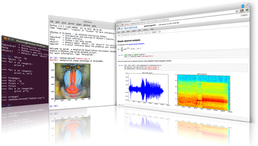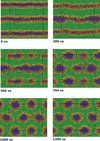IPython/Jupyter Notebook

IPython and its language agnostic successor Jupyter provides a rich architecture for interactive computing with:
- Powerful interactive shells (terminal and Qt-based).
- A browser-based notebook with support for code, text, mathematical expressions, inline plots and other rich media.
- Support for interactive data visualization and use of GUI toolkits.
- Flexible, embeddable interpreters to load into your own projects.
- Easy to use, high performance tools for parallel computing.
We use IPython/Jupyter for documentation, reporting, data exploration, code development and regression tests.
For queries about this topic, contact Hans Fangohr.
View the calendar of events relating to this topic.
Projects

Automatic Image Retrieval with Soft Biometrics for Surveillance
Mark Nixon, John Carter (Investigators), Daniel Martinho-Corbishley
We're investigating ways to automatically describe and identify pedestrians from surveillance footage using human understandable, soft biometric labels. Our goal is to enable surveillance operators to search for pedestrians in a video network using soft biometric descriptions, and to automatically retrieve these descriptions from CCTV images.

Centre for Doctoral Training in Next Generation Computational Modelling
Hans Fangohr, Ian Hawke, Peter Horak (Investigators), Susanne Ufermann Fangohr, Thorsten Wittemeier, Kieran Selvon, Alvaro Perez-Diaz, David Lusher, Ashley Setter, Emanuele Zappia, Hossam Ragheb, Ryan Pepper, Stephen Gow, Jan Kamenik, Paul Chambers, Robert Entwistle, Rory Brown, Joshua Greenhalgh, James Harrison, Jonathon Waters, Ioannis Begleris, Craig Rafter
The £10million Centre for Doctoral Training was launched in November 2013 and is jointly funded by EPSRC, the University of Southampton, and its partners.
The NGCM brings together world-class simulation modelling research activities from across the University of Southampton and hosts a 4-year doctoral training programme that is the first of its kind in the UK.

Directing magnetic skyrmion traffic flow with nanoscale patterning.
Hans Fangohr (Investigator), Mark Vousden
Skyrmions in magnetic nanostructures may lead to new data storage technologies. Appropriate simulation methodologies are developed and applied.

Fidelity optimisation in an atomic quantum computer
Timothy Freegarde (Investigator), Jack Saywell
Development of optimised composite pulses for atomic quantum computers with the aim of reducing systematic errors in information processing caused by variations in laser intensity and environment.

Fluid Dynamics Optimisation of Rim-Drive Thrusters and Ducted Hydrokinetic Generators
Aleksander Dubas, Suleiman Sharkh (Investigators)
This is a Knowledge Transfer Partnership project is a collaboration between the University of Southampton and TSL Technology Ltd. to develop computational fluid dynamics software design tools for modelling and optimising the design of propeller thrusters and water turbine generators.

Magnon-Driven Domain-Wall Dynamics in the presence of Dzyaloshinskii-Moriya Interaction
Hans Fangohr (Investigator), Weiwei Wang
The domain wall motion induced by spin waves (magnons) in the presence of Dzyaloshinskii-Moriya Interaction is studied in this project.

Mathematical tools for analysis of genome function, linkage disequilibrium structure and disease gene prediction
Mahesan Niranjan, Andrew Collins, Reuben Pengelly (Investigators)
This iPhD project uses a Gaussian Bayesian Networks framework through Machine learning methods to predict which genes are involved in the development of different diseases.

Mathematical tools for analysis of genome function, linkage disequilibrium structure and disease gene prediction
Andrew Collins, Mahesan Niranjan, Reuben Pengelly (Investigators), Alejandra Vergara Lope
This iPhD project uses a Gaussian Bayesian Networks approaches framework through machine learning approach to predict which genes are involved in the development of different diseases.

Mathematical tools for analysis of genome function, linkage disequilibrium structure and disease gene prediction
Mahesan Niranjan, Andrew Collins, Reuben Pengelly (Investigators)
This PhD project uses a Monte Carlo molecular simulation processes approach to predict which genes are involved in the development of different diseases.

Multimode simulation of high power fibre lasers and amplifiers
Peter Horak (Investigator), Ioannis Begleris
This project aims to address the challenge of ever-increasing demand for higher powers from fibre lasers by developing theoretical and numerical methods to simulate laser pulse amplification in large-mode area fibres supporting multiple spatial modes.

Multiscale Relativistic Simulations
Ian Hawke (Investigator), Alex Wright
There has been recent success in experiments, such as LIGO, in detecting the mergers of celestial objects via the gravitational waves they emit. By implementing numerical methods, we aim to speed up the numerical simulations of these events but up to two orders of magnitudes, and study binary inspirals in greater detail and over much larger timespans.

Nmag - computational micromagnetics
Hans Fangohr, Thomas Fischbacher (Investigators), Matteo Franchin, Andreas Knittel, Maximilian Albert, Dmitri Chernyshenko, Massoud Najafi, Richard Boardman
Nmag is a micromagnetic simulation package based on the general purpose multi-physics library nsim. It is developed by the group of Hans Fangohr and Thomas Fischbacher in the School of Engineering Sciences at the University of Southampton and released under the GNU GPL.

OpenDreamKit
Hans Fangohr (Investigator), Marijan Beg
OpenDreamKit is a [Horizon 2020](https://ec.europa.eu/programmes/horizon2020/) European Research Infrastructure project (#676541) providing substantial funding to the open-source computational mathematics ecosystem, and in particular popular tools such as LinBox, MPIR, SageMath, GAP, Pari/GP, LMFDB, Singular, MathHub, and the IPython/Jupyter interactive computing environment.
Pushing the Envelope of Planetary Formation and Evolution Simulations
Peter Bartram
A full understanding of the formation and the early evolution of the Solar System and extrasolar planetary systems ranks among natural science's grand challenges, and at present, even the dominant processes responsible for generating the observed planetary architecture remain elusive.

Reversal of ferromagnetic nanotubes
Hans Fangohr (Investigator), David Cortes
We are analysing the feasibility of reversing a nano scaled magnetic tube by applying weak pulses of currents through the nano-tube inner core

Simulation of biological systems at long length and distance scales
Jonathan Essex (Investigator), Kieran Selvon
This project aims to shed light on cell membrane mechanisms which are difficult to probe experimentally, in particular drug permiation across the cell membrane. If one had a full understanding of the mechanism, drugs could be designed to target particular embedded proteins to improve their efficacy, the viability of nano based medicines and materials could also be assessed, testing for toxicity etc.

Skyrmionic states in confined nanostructures
Hans Fangohr (Investigator), Marijan Beg
An ever increasing need for data storage creates great challenges for the development of high-capacity storage devices that are cheap, fast, reliable, and robust. Because of the fundamental constraints of today's technologies, further progress requires radically different approaches. Magnetic skyrmions are very promising candidates for the development of future low-power, high-capacity, non-volatile data storage devices.

Stability of chiral structures in magnetic nanodisks
Hans Fangohr, Weiwei Wang (Investigators), David Cortes
This project is aimed to study the stability of skyrmionic and helical equilibrium states in magnetic nanodisks, using computational simulations.
People
 Andrew Collins
Andrew CollinsProfessor, Medicine (FM)
 Jonathan Essex
Jonathan EssexProfessor, Chemistry (FNES)
 Hans Fangohr
Hans FangohrProfessor, Engineering Sciences (FEE)
 Mahesan Niranjan
Mahesan NiranjanProfessor, Electronics and Computer Science (FPAS)
 Mark Nixon
Mark NixonProfessor, Electronics and Computer Science (FPAS)
 Suleiman Sharkh
Suleiman SharkhProfessor, Engineering Sciences (FEE)
 Peter Horak
Peter HorakReader, Optoelectronics Research Centre
 Tobias Keller
Tobias KellerReader, Ocean & Earth Science (FNES)
 John Carter
John CarterSenior Lecturer, Electronics and Computer Science (FPAS)
 Timothy Freegarde
Timothy FreegardeSenior Lecturer, Physics & Astronomy (FPAS)
 Reuben Pengelly
Reuben PengellySenior Lecturer, Medicine (FM)
 Ian Hawke
Ian HawkeLecturer, Mathematics (FSHS)
 Richard Boardman
Richard BoardmanSenior Research Fellow, Engineering Sciences (FEE)
 Petros Bogiatzis
Petros BogiatzisResearch Fellow, Ocean & Earth Science (FNES)
 Aleksander Dubas
Aleksander DubasResearch Fellow, Engineering Sciences (FEE)
 Jason Hilton
Jason HiltonResearch Fellow, Social Sciences (FSHS)
 Thomas Kluyver
Thomas KluyverResearch Fellow, Engineering Sciences (FEE)
 Maximilian Albert
Maximilian AlbertPostgraduate Research Student, Engineering Sciences (FEE)
 Peter Bartram
Peter BartramPostgraduate Research Student, University of Southampton
 Ioannis Begleris
Ioannis BeglerisPostgraduate Research Student, Engineering Sciences (FEE)
 Rory Brown
Rory BrownPostgraduate Research Student, Civil Engineering & the Environment (FEE)
 Paul Chambers
Paul ChambersPostgraduate Research Student, Engineering Sciences (FEE)
 Dmitri Chernyshenko
Dmitri ChernyshenkoPostgraduate Research Student, Engineering Sciences (FEE)
 David Cortes
David CortesPostgraduate Research Student, Engineering Sciences (FEE)
 Samuel Diserens
Samuel DiserensPostgraduate Research Student, Engineering Sciences (FEE)
 Joseph Egan
Joseph EganPostgraduate Research Student, Mathematics (FSHS)
 Robert Entwistle
Robert EntwistlePostgraduate Research Student, Engineering Sciences (FEE)
 Stephen Gow
Stephen GowPostgraduate Research Student, Engineering Sciences (FEE)
 Joshua Greenhalgh
Joshua GreenhalghPostgraduate Research Student, Engineering Sciences (FEE)
 James Harrison
James HarrisonPostgraduate Research Student, Engineering Sciences (FEE)
 Harry L
Harry LPostgraduate Research Student, Biological Sciences (FNES)
 David Lusher
David LusherPostgraduate Research Student, Engineering Sciences (FEE)
 Nicholas McCaw
Nicholas McCawPostgraduate Research Student, Engineering Sciences (FEE)
 Juraj Mihalik
Juraj MihalikPostgraduate Research Student, Engineering Sciences (FEE)
 Gregory Parkes
Gregory ParkesPostgraduate Research Student, Electronics and Computer Science (FPAS)
 Alvaro Perez-Diaz
Alvaro Perez-DiazPostgraduate Research Student, Engineering Sciences (FEE)
 Richard Pichler
Richard PichlerPostgraduate Research Student, Civil Engineering & the Environment (FEE)
 Daniel Powell
Daniel PowellPostgraduate Research Student, Engineering Sciences (FEE)
 Craig Rafter
Craig RafterPostgraduate Research Student, Engineering Sciences (FEE)
 Hossam Ragheb
Hossam RaghebPostgraduate Research Student, Engineering Sciences (FEE)
 Sabin Roman
Sabin RomanPostgraduate Research Student, University of Southampton
 Jack Saywell
Jack SaywellPostgraduate Research Student, Engineering Sciences (FEE)
 Kieran Selvon
Kieran SelvonPostgraduate Research Student, Engineering Sciences (FEE)
 Ashley Setter
Ashley SetterPostgraduate Research Student, Engineering Sciences (FEE)
 Alejandra Vergara Lope
Alejandra Vergara LopePostgraduate Research Student, Engineering Sciences (FEE)
 Jonathon Waters
Jonathon WatersPostgraduate Research Student, Engineering Sciences (FEE)
 Thorsten Wittemeier
Thorsten WittemeierPostgraduate Research Student, Engineering Sciences (FEE)
 Alex Wright
Alex WrightPostgraduate Research Student, Civil Engineering & the Environment (FEE)
 Emanuele Zappia
Emanuele ZappiaPostgraduate Research Student, Engineering Sciences (FEE)
 Susanne Ufermann Fangohr
Susanne Ufermann FangohrAdministrative Staff, Civil Engineering & the Environment (FEE)
 Thomas Fischbacher
Thomas FischbacherAlumnus, Engineering Sciences (FEE)
 Matteo Franchin
Matteo FranchinAlumnus, Engineering Sciences (FEE)
 Jan Kamenik
Jan KamenikAlumnus, University of Southampton
 Andreas Knittel
Andreas KnittelAlumnus, Industry
 Arthur Lugtigheid
Arthur LugtigheidAlumnus, Psychology (FSHS)
 Massoud Najafi
Massoud NajafiAlumnus, Arbeitsbereich Technische Informatik Systeme, University of Hamburg, Germany
 Weiwei Wang
Weiwei WangAlumnus, Ningbo University
 Marijan Beg
Marijan BegExternal Member, Imperial College London
 Mark Vousden
Mark VousdenExternal Member, University of Southampton
 Daniel Martinho-Corbishley
Daniel Martinho-CorbishleyNone, None